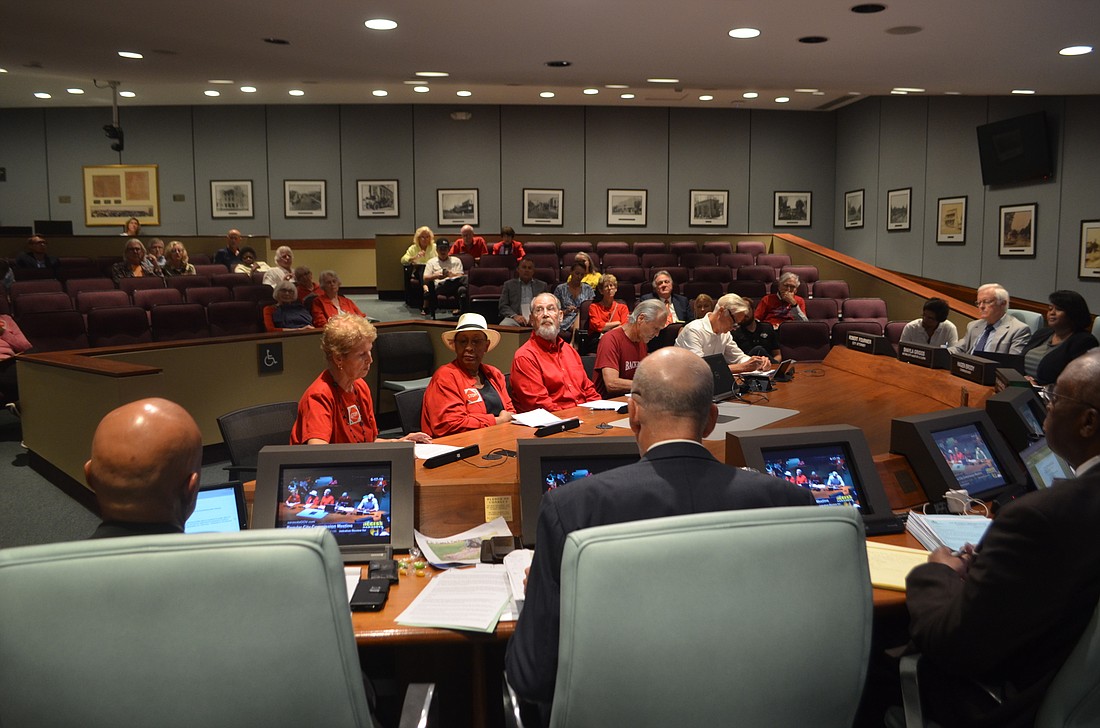- January 14, 2025
-
-
Loading

Loading

After nearly three years of contentious debate regarding the process of reviewing proposed developments, the City Commission declined to make any changes to the procedures currently in place.
In a series of 3-2 decisions Monday, the commission voted to maintain two existing systems for reviewing proposed site plans. One, applicable to downtown, allows staff to administratively review many projects without holding any public hearing on the plans. The second, in effect outside of downtown, has a lower threshold for triggering public hearings in front of the city’s Planning Board.
Rather than change the review procedures, a majority of the commission voted instead to focus on adjusting the zoning code in hopes of addressing public concerns associated with new development.
“I think a lot of the issues that have been brought up would be addressed by better zoning regulations and not necessarily changing the process,” Planning Director Steve Cover said.
Since 2016, the resident activist group STOP has advocated against the more expansive use of administrative review in place downtown. The group has lobbied the city to instead hold public hearings for all projects larger than 10,000 square feet, the standard currently in place outside of downtown. The city expanded administrative review in 2004 following the development of a downtown master plan and the implementation of new zoning rules in the heart of the city.
STOP members say public hearings are an opportunity for increased public input on new developments. Resident groups including the Downtown Sarasota Condominium Association and the Coalition of City Neighborhood Associations also supported increasing the number of public hearings for downtown projects.
“I consider our citizens the owners of our cities,” said Mollie Cardamone, a member of STOP’s steering committee. “I believe we should return to listening to and involving those owners.”
Members of the development and business community voiced support for the administrative review process. They said public hearings made development a lengthier and less certain proposition that empowered a volunteer advisory board, rather than professional staff, to make a final decision on whether a project complied with the city’s zoning regulations.
Speakers at Monday’s meeting questioned the idea public hearings would produce higher quality development.
“A subjective political process for approval changes the redevelopment landscape of the community and makes investing in Sarasota risky and uncertain,” Argus Foundation Executive Director Christine Robinson said. “If you don’t like what’s going on, change the code, not the process.”
Although staff presented a proposal that would lower the standards for holding public hearings downtown, a majority of the commission agreed with Robinson’s suggestion. Commissioner Hagen Brody rebuked the criticism of administrative review. He said STOP’s messaging gave residents an incorrect understanding of the degree to which review procedures influenced new construction.
Brody said he thought STOP leaders were advocating for more public hearings because it would provide an opportunity for them to exert more influence over the development review process, comments that drew displeasure from members of the audience.
Although both city staff members and the Planning Board would be tasked with enforcing the same zoning regulations, Brody suggested holding public hearings in front of an appointed advisory board could invite corruption from both residents and developers.
“Some things you want professionals to decide on,” Brody said.
Commissioner Jen Ahearn-Koch, a founding member of STOP, said she believed Brody’s comments were a personal attack on her, which he denied. Ahearn-Koch advocated for adopting STOP’s recommendation on expanding public hearings downtown. She said the subject was a point of emphasis she heard frequently when speaking with constituents.
“When a citizen purchases a piece of property in this city, not only are they our bosses and taxpayers, but they also make an investment, and their investments matter too,” Ahearn-Koch said. “They’re buying a quality of life in a community where their voice has some weight.”
Commissioner Willie Shaw was the only other vote in support of expanding the use of public hearings downtown. The rest of the board voted to direct staff to focus on preparing zoning code changes related to issues including setbacks and sidewalk widths, common subjects of public input regarding development proposals.
“A lot of the issues and concerns are really zoning items, not process issues,” Cover said.